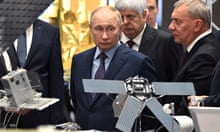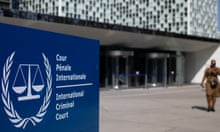The British government and intelligence agencies failed to conduct any proper assessment of Kremlin attempts to interfere with the 2016 Brexit referendum, according to the long-delayed Russia report.
The damning conclusion is contained within the 50-page document from parliament’s intelligence and security committee, which said ministers in effect turned a blind eye to allegations of Russian disruption.
It said the government “had not seen or sought evidence of successful interference in UK democratic processes” at the time, and it made clear that no serious effort was made to do so.
“The report reveals that no one in government knew if Russia interfered in or sought to influence the referendum because they did not want to know,” said Stewart Hosie, a Scottish National party MP who sits on the cross-party committee.
“The UK Government have actively avoided looking for evidence that Russia interfered. We were told that they hadn’t seen any evidence, but that is meaningless if they hadn’t looked for it.”
The committee, which scrutinises the work of Britain’s spy agencies, said: “We have not been provided with any post-referendum assessment of Russian attempts at interference”. It contrasted the response with that of the US.
This article includes content provided by Scribd. We ask for your permission before anything is loaded, as they may be using cookies and other technologies. To view this content, click 'Allow and continue'.
“This situation is in stark contrast to the US handling of allegations of Russian interference in the 2016 presidential election, where an intelligence community assessment was produced within two months of the vote, with an unclassified summary being made public.”
Committee members said they could not definitively conclude whether the Kremlin had or had not successfully interfered in the referendum that led to the UK quitting the European Union because no effort had been made to find out.
“Even if the conclusion of any such assessment were that there was minimal interference, this would nonetheless represent a helpful reassurance to the public that the UK’s democratic processes had remained relatively safe,” said the report.
After the government immediately rebuffed calls for a full investigation, Labour last night accused it of failing in its response to the security threat posed to UK democracy by Russia.
Speaking ahead of an urgent question in parliament on Wednesday, the shadow home secretary, Nick Thomas-Symonds, said that “on every level, the government’s response does not appear to be equal to the threat”.
“This report outlines the scale of the shortcomings of the government’s response to maintaining our national security in the face of what is clearly a growing and significant threat from Russia,” he said.
Drawn up by a cross-party committee of MPs and peers, the report is the product of 18 months’ work involving evidence taken from the UK’s spy agencies and independent experts. Although its long-delayed version is heavily redacted, the thrust of its conclusions – that insufficient attention has been paid to Russian infiltration in British politics and public life – was clear.
Committee members noted that publicly available studies have pointed to “the preponderance of pro-Brexit or anti-EU stories” on the Russia Today and Sputnik TV channels at the time of the vote, and “the use of ‘bots’ and ‘trolls’” on Twitter, as evidence of Russian attempts to influence the process.
There was “credible open source commentary” that Russia undertook “influence campaigns” relating to the 2014 Scottish independence referendum, but despite this, no effort was made to look at the Kremlin threat to British democracy until after the Brexit vote.
It was only after Russia hacked US Democratic party emails in July 2016 that any assessment appeared to have been made – and the document suggests that some sort of exercise was conducted after the 2017 general election.
“Had the relevant parts of the intelligence community conducted a similar threat assessment prior to the referendum, it is inconceivable that they would not have reached the same conclusion as to Russian intent, which might then have led them to take action to protect the process,” the report added.
An official UK government response said: “We have seen no evidence of successful interference in the EU referendum,” and added that there was no need to launch an inquiry because Britain’s spy agencies made “regular assessments” of the Russian threat.
“Given this long-standing approach, a retrospective assessment of the EU referendum is not necessary,” it said.
Foreign Secretary Dominic Raab rejected claims the government had “actively” sought not to delve deeper into the perceived threat of Russian interference.
“We’ve got a long period recognising the enduring, significant threat posed by Russia to the UK, including in cyber. Russia is a top national security priority,” he said.
But Hosie was scathing about the refusal by both Boris Johnson and Theresa May to look at Kremlin interference in the aftermath of the Brexit vote.
“No one wanted to test this issue with a 10ft bargepole,” he said, adding that it was an “outrage” the report was not published before last December’s election. Downing Street “took its eye off the ball” over the Russian threat, the MP said, it underestimated the response required and was still trying to play “catch-up”.
Britain has also become “a favourable destination for Russian oligarchs and their money”, observed the committee, concluding they had become a corrupting force in British public life through their connections.
Citing no names, it also warned that it was “notable that a number of members of the House of Lords have business interests linked to Russia, or work directly for major Russian companies linked to the Russian state”.
Marina Litvinenko, whose husband, Alexander, was murdered in 2006 in London by Kremlin assassins, said she was “very pleased” by the report, and its mention of Russian oligarchs making political donations.
She said the report demonstrated there was ample evidence of the threat posed by the Kremlin to the UK. “The government has no excuse for being naive. After what happened to my husband in 2006 and to Sergei Skripal in 2018 there are no excuses. There are too many suspicious deaths.”
Ministers had long claimed there were “no successful examples” of Kremlin interference in British politics but abandoned that position last week when Raab, the blamed “Russian actors” for spreading an illegally obtained dossier relating to US-UK trade talks that eventually ended up in the hands of the former Labour leader Jeremy Corbyn during the election campaign.
Committee members complained that when they asked for written evidence from MI5 at the start of their inquiry about possible interference in the Brexit vote, the domestic spy agency “initially provided just six lines of text”.
The report was completed last October, but was sat on by Johnson before the general election and only declassified and cleared for release by the prime minister in December. It could not be released until No 10 had nominated Conservative members to the committee, although its nominee for the chair, Chris Grayling, was ambushed by opposition members who voted instead for Julian Lewis.
Lewis then had the Conservative whip removed, but the newly independent MP was unrepentant as the report was published, accusing Downing Street of politicising the oversight of the intelligence agencies.
“This committee has been subject to unprecedented delay and dislocation. this must never happen again. the sooner normal relations are established between this government and the committee, the better for all concerned,” the committee chair said.
Russian officials angrily protested the conclusions of the report, accusing the UK of taking a “leading role in Russophobia” and claimed it cleared Moscow of attempts to influence the 2016 Brexit referendum.
“The charges are once again unfounded, unsubstantiated and unconvincing,” said Konstantin Kosachev, the head of the foreign affairs committee of Russia’s federation council, a lawmaking body, in written remarks on Tuesday.









